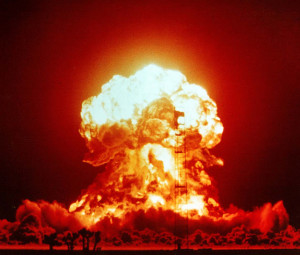I guess you could say that in the past year I've gotten into lifting weights, or just "lifting" if you're a bro. In the lifting world, there is something of a divide between bodybuilders (people who lift for size and definition) and powerlifters (people who try to move as much weight as possible).
Now, for bodybuilders the goal isn't really to be "strong", it is mostly to "look strong", although for many strength is a natural side effect of their training. For powerlifters, the goal is not to "look strong", but to "be strong", although, for many, muscle mass and definition are natural side effects of their training.
In the end, elite bodybuilders and elite powerlifters will probably look different and be able to move different amounts of weight, but they will both be bigger and stronger than the average person.
Now, over the years I've experimented with both types of routines, and have so far seen more success with my current strength training regimen. For me, it fits my lifestyle and my goals of developing functional strength, and I've actually seen decent gains to the look of my physique as well.
So, as someone who does not consider himself a "bodybuilder", I have somewhat of a natural disdain for those in the bodybuilding camp, doing their curls and skipping on squats and deadlifts. At some level, though, they may actually be right.

This guy again
Photo credit: Nathan Rupert
Bodybuilding has gained tremendous popularity in the post-WWII era, probably due to increasingly sedentary lifestyles and lack of physical activity. Since modern conveniences have reduced the need for manual labor and functional strength, it doesn't really matter if you are legitimately strong anymore, all that matters is how you look. Again, this is not to say that bodybuilders aren't strong, it is just an acknowledgement that gaining strength isn't the main goal for them.
On the surface, bodybuilding seems to be motivated by pure vanity, but maybe it really isn't, maybe there is a practical reason for just "looking strong." Aside from the obvious reason of attracting the opposite sex, looking strong has another key benefit.
For men, strength has always been a figure of merit. The stronger you are, the more you are validated as a "man". The main reason for this is the ability to hold one's own in a fight. Every man has either fought another man or contemplated fighting another man, it's just what we do. Now, the reasons for not fighting another man can range from total control of your emotions and ability to resist the primal urges that you have, or it can be motivated by "that dude looks bigger than me and would probably kick my ass."
The former is, in my opinion, something that should be mastered by all men. We all want to fight at some point or another, but in many cases fighting is just not the best thing to do, and will end in more harm than good. It is best, as a man, to be able to exercise this kind of self control. The truly strong man does not feel the need to fight, because he feels he has nothing to prove, all his validation comes from within.
The latter, though, is a bit more interesting. Perhaps you have complete control of your emotions and have no desire to fight, but someone who wants to fight you apparently has not mastered that skill. They really want to hurt you; maybe it's your fault, maybe it isn't, but regardless, you could be in trouble. Now, if you look strong and intimidating, then that could detour them from actually fighting you, and, just like that, you won the fight without throwing a single punch.
In this sense, bodybuilding can be seen as extremely practical, and not just motivated by pure vanity. Sure, you could instead spend your time actually training to be better at fighting, so that if the occasion arose you would be able to hold your own and "win" the fight, but that would still involve fighting. The problem with actually fighting is that, even if you are better than your opponent, both of you can still get hurt in the process. The beauty of the "intimidation" approach is that the fight never actually takes place, and no one gets hurt.
How This Relates to Foreign Policy
I'd like to now relate two men fighting each other to two countries fighting each other. Just as in the above example, if one country is afraid to fight another for fear of losing, then a war never takes place, and there isn't a massive loss of life.
There is an interesting video that I have embedded below, which details the death toll statistics seen in World War II. It sounds like a depressing topic, and it is, but the video ends with something of an optimistic tone. It basically puts into perspective the staggering losses that so many countries faced during the war, and shows how no war after WWII has come even close to the same numbers.
A big reason for this was the Cold War between the U.S./NATO countries and the Soviet Union. Since both powers had/have nuclear arsenals, they trod very lightly when it came to provoking each other. Each side realized how devastating a nuclear attack would be, and, so far, a massive war between the two sides has not occurred (knock on wood).
Sure, they engaged in many "proxy wars" over the years, but the proxy wars did not have near the magnitude of an all out war between the two sides. In the video, the time after WWII has even been referred to as "the great peace." While certain social groups in the '60s may not have agreed, the numbers certainly make a convincing case.
Since much of the Cold War was "not fought" out of fear of nuclear annihilation, one could argue that the invention of the nuclear bomb could be heralded as one of the most humanitarian inventions of all time. Sure, it did kill a whole lot of people in Japan in 1945, but if it didn't, then no one would ever really understand the devastation that it could inflict. Maybe I'm being a little too defensive for the actions of past presidents, but the general consensus that I've heard was that the death tolls would have been far greater had we not dropped the bombs.

Pictured: the weapon that created world peace Photo Credit The Official CTBTO Photostream
People can whine a lot about "why does the country spend so much on defense and not education or infrastructure?" While this is a valid concern, you could argue that the cost of not spending on defense could be far greater. It's not the answer that most people want to hear, but if America as a country lost its foothold as a world power, then some horrible things might happen.
The thought of "world peace" as a result of mutual fear of attack may not be the most comforting thing to think about, but it may be the world's best option. I'll argue that John Lennon's dream of world peace from the song "Imagine" isn't too feasible. As a whole, people will never be able to truly accept and understand each other. We can make our best efforts, but at our core we are selfish and a little bit racist.
Humanity may never reach the point where we trust each other and shake hands without holding loaded guns behind our backs. If that's the case, then let's hope that all the superpowers are intimidating (and smart) enough to make the choice that it simply would not be worth it to attack each other. I really hope it works out that way.


